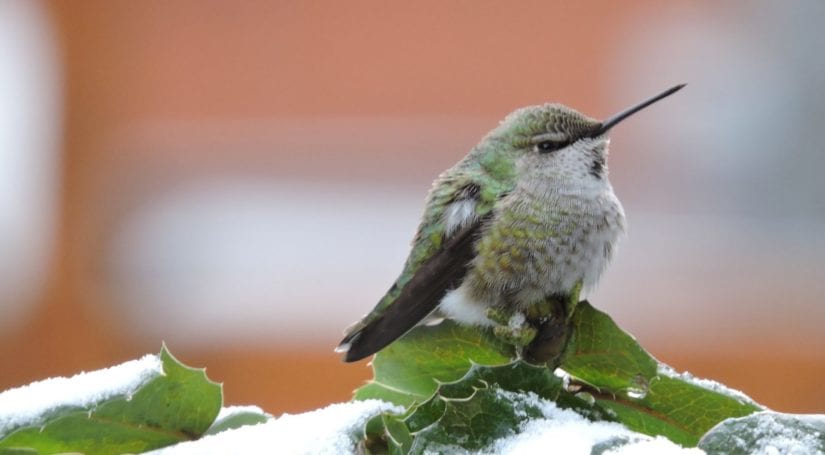As the temperatures plummet and the wind grows icy, we sometimes wonder how we’ll ever survive until spring! The winter months pose many challenges not only for companion and farm animals, but for wildlife as well.
Luckily they – just like us – have developed strategies and adaptations to help them make it through the chilly season. Here are some ways wild animals have adapted and some tips for how you can help them along this winter.

1. Food
Colder temperatures mean that wild animals expend more energy to keep warm. While many mammals grow thicker coats, and birds fluff their feathers to trap warm air close to their bodies, it is still a challenge to stay cozy at this time of year.
They also burn extra calories in cold weather to maintain their body temperature. Wild animals meet this higher energy demand by preparing ahead and packing on extra weight or catching food during the summer and fall.
During the winter season, wild animals are also often less active and it is more common to spot wildlife resting during the day – a savvy energy-saving strategy. They will take advantage of clear days between stormy weather to forage, so you might suddenly see a lot of activity in your backyard or along the trails when nice weather hits.
How to Help
For the most part, wild animals don’t require any extra food from us humans, and often feeding them can do more harm than good. However, if you do have any bird feeders out, get the facts on how to keep birds healthy and safe. Hummingbird feeders have extra considerations too – learn how to keep hummingbirds safe in winter.
When you spot wildlife at rest, try not to disturb them – the extra energy they’ll spend evading you could be better used to help them keep warm.
2. Water
Water can cause problems for wildlife in winter in two different ways: there can be too little of it, or it can freeze. Either way, water scarcity can be a challenge for wild animals.
Both birds and mammals sometimes resort to eating snow to get the moisture they need, but the colder temperature of the snow can make it harder for their bodies to process.
Frozen water bodies create an extra challenge for wildlife. Besides making the water inaccessible, there is a risk that water-faring animals can become frozen to newly-formed ice if temperatures drop suddenly (particularly overnight).
How to Help
When temperatures are below freezing, putting out a bird bath or extra water source that is changed daily to prevent icing over is a great way to help your local wild neighbours get an extra drink.
If there has been a sudden decrease in temperature, check local ponds and water sources for any wildlife that may be in distress – contact your local wildlife rehabilitation centre or the BC SPCA Animal Helpline at 1-855-622-7722 to find out how best to help.
3. Shelter
Shelter can also become more important during winter weather than during the temperate summer months. Many animals migrate or hibernate for the winter, but others brave the snow and rain and stay in their home territory year-round.
This doesn’t mean they are always able to withstand the elements, though. Stormy weather or unseasonably cold temperatures can cause wildlife to take shelter in unlikely places.
If you spot deer, raccoons, or other animals sheltering under decks, inside sheds, or alongside houses, it might be a run of wild weather driving them closer than normal to human dwellings. It’s also common for animals to take shelter in the bumper of your car, especially if the engine is still warm — that’s why it’s important to “think and thump!”
If you notice any wildlife appearing injured or lethargic, call your local wildlife rehabilitator or the BC SPCA Animal Helpline at 1-855-622-7722.
How to Help
Birdhouses are a great year-round help for many songbird species.
Nesting season does not typically start until early spring, but during the colder winter months many birds will gratefully take advantage of the shelter offered by a birdhouse. On particularly cold nights you might see a surprising number of flock birds like bushtits or wrens taking advantage of a birdhouse together!
